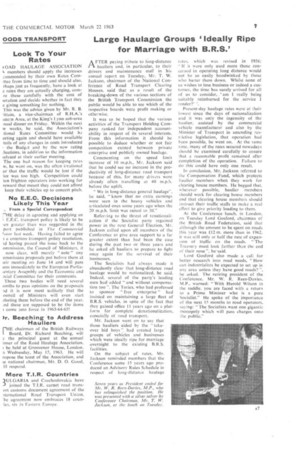Large Haulage Groups 'Ideally Ripe for Marriage with B.R.S.'
Page 9

If you've noticed an error in this article please click here to report it so we can fix it.
A FTER paying tribute to long-distance
hauliers and, in particular, to their drivers and maintenance staff in his annual report on Tuesday, Mr. T. W. Jackson, chairman of the National Conference of Road Transport Clearing Houses, said that as a result of the breaking-down of the various sections of the British Transport Commission the public would be able to see which of the respective boards were profit making or otherwise.
It was to be hoped that the various activities of the Transport Holding Company ranked for independent account. ability in respect of its several interests. From this information it should be possible to deduce whether or not fair competition existed between private enterprise and publicly owned haulage.
Commenting on the speed limit increase of 10 m.p.h., Mr. Jackson said that he could see no increase in the productivity of long-diStance road transport because of this, for many drivers were already often travelling at 40 m.p.h. before the uplift.
" We in long-distance general haulage", he said, " know that no extra earnings were seen in the heavy vehicles and articulated ones some years ago when the 20 m.p.h. limit was raised to 30."
Referring to the threat of renationalization if the Socialist party regained power in the next General -Election, Mr. Jackson called upon all members of the Conference to give area support to a far greater extent than had been the case during the past two or three years and he asked all hauliers to prepare to light once again for the survival of their businesses.
The Socialists had always made it abundantly clear that long-distance road haulage would be nationalized, he said, Indeed:, several of the party's leading men had added " and without compensation too". The Tories, who had professed to sponsor "free enterprise" had insisted on maintaining a large fleet of B.R.S. vehicles, in spite of the fact that they gained office 11 years ago on a platform for complete denationalization, especially of road transport.
Mr. Jackson went on to say that those hauliers aided by the takeover bid boys ", had created large groups of vehicles and businesses which were ideally ripe for marriage overnight to the existing B.R.S. facilities.
On the subject of rates, Mr. Jackson reminded members that the Conference some 15 years ago produced an Advisory Rates Schedule in respect of long-distance haulage rates, which was revised in 1956: " If it were only used more those concerned in operating long distance would not he so easily hoodwinked by those who barter them down. Whilst none of us wishes to lose business or indeed a customer, the time has surely arrived for all of us to consider, :` am I really being suitably reimbursed for the .service I render?'
Present-day haulage rates were at their lowest since the days of nationalization and it was only the ingenuity of the haulier, assisted by the commercial vehicle manufacturer and also by the Minister of Transport in amending restrictive legislation, that operation had been possible, he went on. At the same time, many of the rates secured nowadays should be examined carefully to ensure that a reasonable profit remained after completion of the operation. Failure to do this could have only one result.
In conclusion, Mr. Jackson referred to the Compensation Fund, which protects haulier members when they work for clearing house member's. He begged that, wherever possible, haulier members should work for clearing house members and that clearing houSe members should instruct their traffic staffs to make a real effort to give priority loading to lhem.
At the Conference lunch, in London, an Tuesday Lord Gosford, chairman of the British Road Federation, said that although the amount to be spent on roads this year was £12 m. more than in 1962,
it was still only at half the rate of expansion of traffic on the roads. "The Treasury must look farther than the end of their nose", he-said.
Lord Gosford also made a call for better research into road needs, "How can industrialists be expected to set up in any area unless they have good roads?
he asked. The retiring president of the Conference. Mr. W. R. Rees-Davies, M.P., warned: " With Harold Wilson in the saddle, you are faced with a return to a Prime Minister who is a pure Socialist." He spoke of the importance of the next 15 months to road operators, saying: "The Socialists want one gigantic monopoly which will pass charges onto the public."




































































































